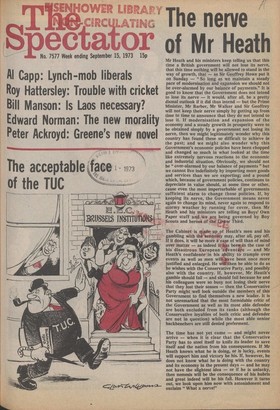Mr Heath and his ministers keep telling us that this
time a British government will not lose its nerve, that this time nothing will be allowed to stand in the way of growth, that — as Sir Geoffrey Howe put it on Sunday — "So long as we maintain a steady pace of modernisation and expansion we should not be over-alarmed by our balance of payments." It is good to know that the Government does not intend to lose its nerve — it would, after all, be a pretty dismal outlook if it did thus intend — but the Prime Minister, Mr Barber, Mr Walker and Sir Geoffrey will not keep their nerve simply by getting up from time to time to announce that they do not intend to lose it. If modernisation and expansion of the economy and a steady growth in prosperity were to be obtained simply by a government not losing its nerve, then we might legitimately wonder Why this country has found these so difficult to achieve in the past; and we might also wonder why this Government's economic policies have been chopped and changed so much in what looked at the time like extremely nervous reactions to the economic and industrial situation. Obviously, we should not be "over-alarmed by our balance of payments" but we cannot live indefinitely by importing more goods and services than we are exporting; and a pound which, because of government policies, continues to depreciate in value should, at some time or other, cause even the most imperturbable of governments sufficient alarm to change those policies. If, by keeping its nerve, the Government means never again to change its mind, never again to respond to stormy weather by running for cover, then Mr Heath and his ministers are telling us Boys' Own Paper stuff and we are being governed by Boy Scouts and heroes ot the III*er Third.
The Cabinet is made up of Heath's men and his gambling with the economy may, after all, pay off. If it does, it will be more a case of will than of mind over matter — as indeed i h,s beetpm the case of his disastrous European It enttire — and Mr Heath's confidence, in his ility to trample over events as well as men wit jive been once more justified and enlarged. He w hen be able to do as he wishes with the Conservative Party, and possibly also with the country. If, however, Mr Heath's gamble should fail — and should fail because he and his colleagues were so busy not losing their nerve that they lost their senses — then the Conservative Party might well look outside the members of this Government to find themselves a new leader. It is not unremarked that the most formidable critic of the Government as well as its most able defender are both excluded from its ranks (although the Conservative loyalties of both critic and defender are not in question) while the most able senior backbenchers are still denied preferment.
The time has not yet come — and might never arrive — when it is clear that the Conservative Party has to steel itself to knife its leader to save itself and the nation from his consequences. If Mr Heath knows what he is doing, or is lucky, events will support him and victory be his. If, however, he does not know what he is doing with the country and its economy in the present days — and he may not have the slightest idea — or if he is unlucky, then nemesis will be the consequence of his hubris and great indeed will be his fall. However it turns out, we look upon him now with astonishment and exclaim What a nerve!"
































